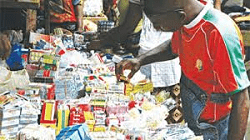The recent announcement by the Minister of Health, Prof. Isaac Adewole, that the implementation of the National Drug Distribution Guidelines (NDDG), has been postponed to January 2019 has once again highlighted how difficult it is to implement progressive initiatives in the Nigerian nation.
 The current postponement is the latest in a string of delays that have dogged the NDDG, since its introduction five years ago. When the federal government first published the document in 2012, its implementation was scheduled for July 2014. Soon after, it was shifted to 2015 to enable stakeholders involved in pharmaceutical distribution to put necessary machineries in place for its smooth implementation.
The current postponement is the latest in a string of delays that have dogged the NDDG, since its introduction five years ago. When the federal government first published the document in 2012, its implementation was scheduled for July 2014. Soon after, it was shifted to 2015 to enable stakeholders involved in pharmaceutical distribution to put necessary machineries in place for its smooth implementation.
As it became obvious that the new date would no longer be feasible, the take-off was again postponed to 1 July, 2017 for the same reasons that it was earlier deferred. With that, it was expected that by the last day in the month of June, stakeholders would have done all that was necessary for the implementation to commence. However, and quite disappointingly, based on another round of consultations with stakeholders few days to the take-off date, the minister of health announced another postponement to January 2019, citing the need for stakeholders to have enough time to ensure physical development of Co-ordinated Wholesale Centres (CWC).
It is indeed worrisome that despite the promising potentialities of the NDDG in helping to sanitise the drug distribution system in the country, those responsible for the successful implementation continue to dillydally on it. Beyond helping to end chaotic drug distribution, the guidelines are also billed to facilitate audit trail of medicine in the health system and finally ensure the much desired closure of the open drug markets, an anomaly that should never have been allowed in the first place.
While the various reasons adduced for the repeated postponements may sound plausible, the endless rigmarole only reflects a culture of poor planning and disrespect for deadlines. This is one of the major reasons the nation as a whole continues to run in circles. There is indeed no denying the importance of ensuring that all stakeholders are on the same page in the implementation of the guidelines. However, we must hasten to add that this endless postponement, if not decisively halted, may eventually scuttle the transformative concept and the anomalies in the drug distribution system will persist for a long time to come.
The importance of ensuring that only genuine drugs are in the health system cannot be over-emphasised. With the NDDG, drugs in the system can be traced from the point of manufacture to when they get to the patient. The Nigerian government must therefore put a stop to this perpetual postponement of this laudable concept and implement the NDDG.
It is commendable that the health minister has declared that there will be no further extension of the deadline, but this must not end up as just another rhetoric from the Nigerian government. It is imperative for the government to do all that is necessary to match declarations with necessary actions, as enough time has been given for all the players to be ready. Shifting the goalpost again on NDDG implementation will only show lack of seriousness about the programme.
We must also urge stakeholders involved in physical development of the Co-ordinated Wholesale Centres (CWC) to expedite action on the projects. The fact is that all players involved in drug distribution can operate at different levels in the NDDG as conceptualised and still be appropriately supervised and monitored as necessary. Therefore, there should be no fear of being displaced from business by the present players in the pharmaceutical distribution business. All they need do is to play by the rules as codified in the NDDG.
It is in the interest of all Nigerians that implementation of the NDDG is given maximum support. The entire citizenry and the nation at large will benefit tremendously from the scheme now and in the future.










